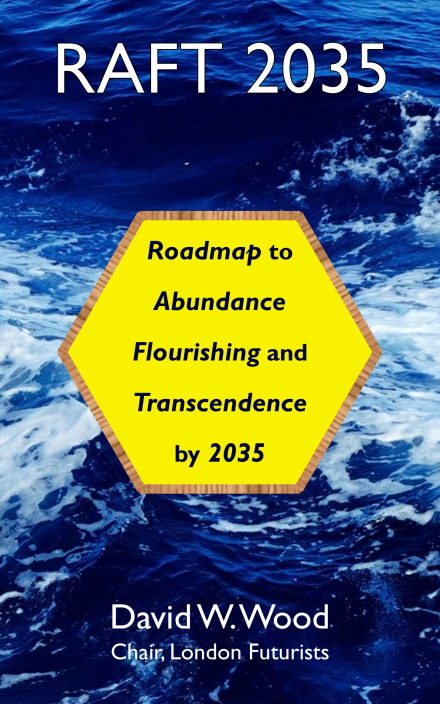The need for a better politics is more pressing than ever.
Since its formation, Transpolitica has run a number of different projects aimed at building momentum behind a technoprogressive vision for a better politics. For a new decade, it’s time to take a different approach, to build on previous initiatives.
The planned new vehicle has the name “RAFT 2035”.
RAFT is an acronym:
- Roadmap (‘R’) – not just a lofty aspiration, but specific steps and interim targets
- towards Abundance (‘A’) for all – beyond a world of scarcity and conflict
- enabling Flourishing (‘F’) as never before – with life containing not just possessions, but enriched experiences, creativity, and meaning
- via Transcendence (‘T’) – since we won’t be able to make progress by staying as we are.
RAFT is also a metaphor. Here’s a copy of the explanation:
When turbulent waters are bearing down fast, it’s very helpful to have a sturdy raft at hand.
The fifteen years from 2020 to 2035 could be the most turbulent of human history. Revolutions are gathering pace in four overlapping fields of technology: nanotech, biotech, infotech, and cognotech, or NBIC for short. In combination, these NBIC revolutions offer enormous new possibilities – enormous opportunities and enormous risks:…
Rapid technological change tends to provoke a turbulent social reaction. Old certainties fade. New winners arrive on the scene, flaunting their power, and upturning previous networks of relationships. Within the general public, a sense of alienation and disruption mingles with a sense of profound possibility. Fear and hope jostle each other. Whilst some social metrics indicate major progress, others indicate major setbacks. The claim “You’ve never had it so good” coexists with the counterclaim “It’s going to be worse than ever”. To add to the bewilderment, there seems to be lots of evidence confirming both views.
The greater the pace of change, the more intense the dislocation. Due to the increased scale, speed, and global nature of the ongoing NBIC revolutions, the disruptions that followed in the wake of previous industrial revolutions – seismic though they were – are likely to be dwarfed in comparison to what lies ahead.
Turbulent times require a space for shelter and reflection, clear navigational vision despite the mists of uncertainty, and a powerful engine for us to pursue our own direction, rather than just being carried along by forces outside our control. In short, turbulent times require a powerful “raft” – a roadmap to a future in which the extraordinary powers latent in NBIC technologies are used to raise humanity to new levels of flourishing, rather than driving us over some dreadful precipice.
The words just quoted come from the opening page of a short book that is envisioned to be published in January 2020. The chapters of this book are reworked versions of the scripts used in the recent “Technoprogressive roadmap” series of videos.
Over the next couple of weeks, all the chapters of this proposed book will be made available for review and comment:
- As pages on the Transpolitica website, starting here
- As shared Google documents, starting here, where comments and suggestions are welcome.

All being well, RAFT 2035 will also become a conference, held sometime around the middle of 2020.
You may note that, in that way that RAFT 2035 is presented to the world,
- The word “transhumanist” has moved into the background – since that word tends to provoke many hostile reactions
- The word “technoprogressive” also takes a backseat – since, again, that word has negative connotations in at least some circles.
If you like the basic idea of what’s being proposed, here’s how you can help:
- Read some of the content that is already available, and provide comments
- If you notice something that seems mistaken, or difficult to understand
- If you think there is a gap that should be addressed
- If you think there’s a better way to express something.
Thanks in anticipation!








